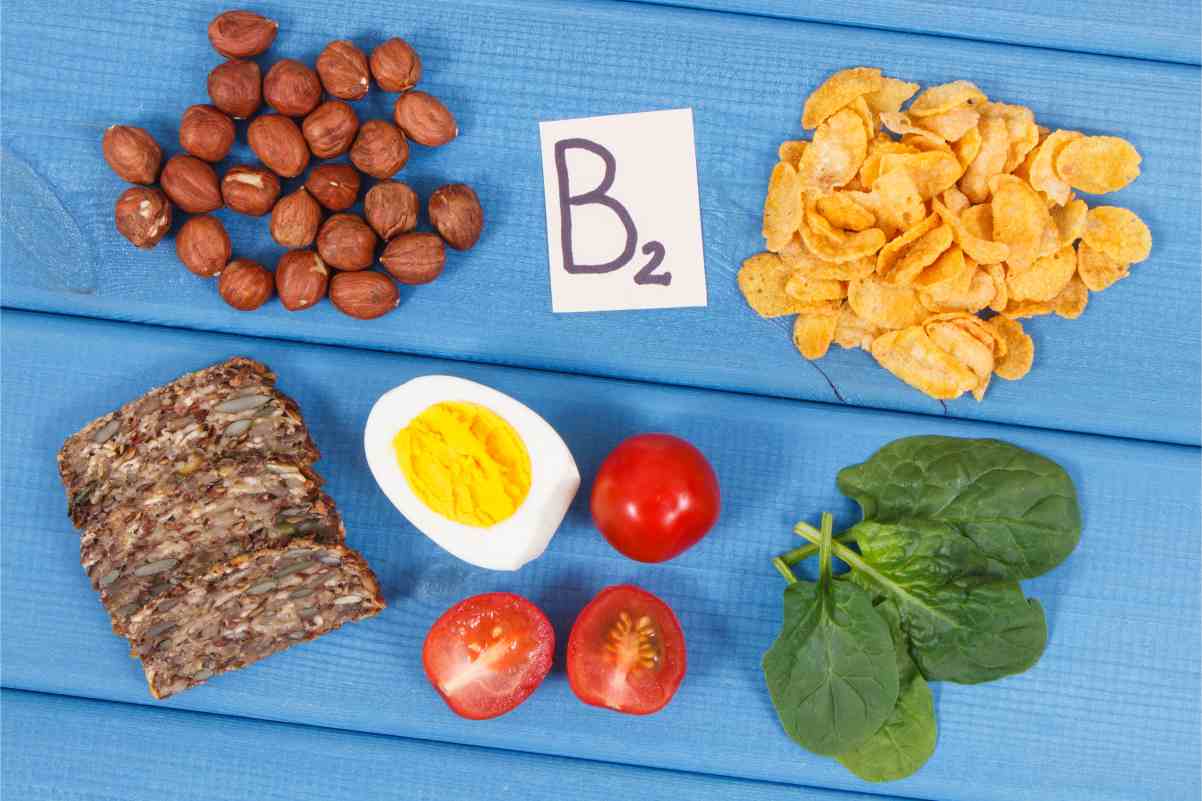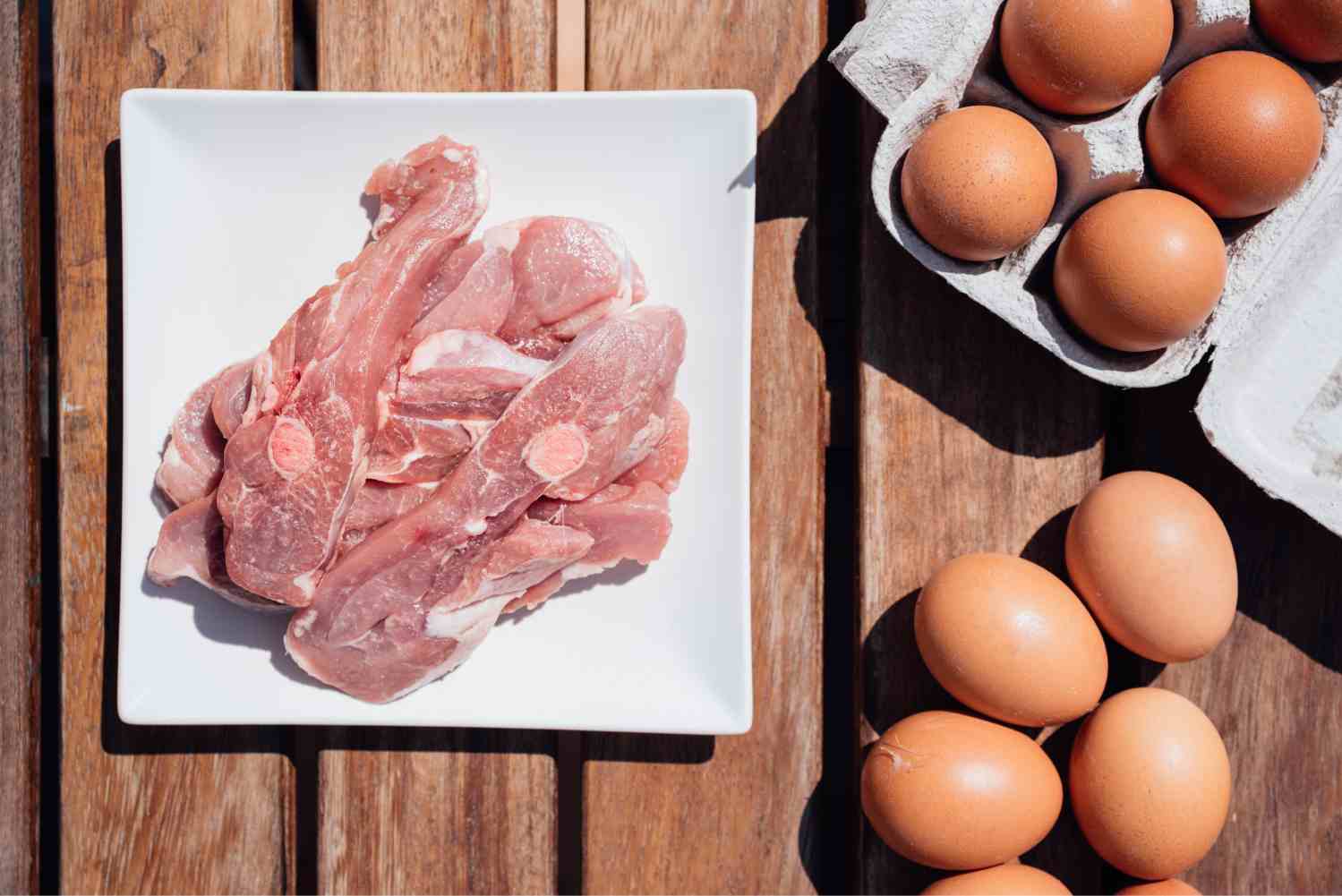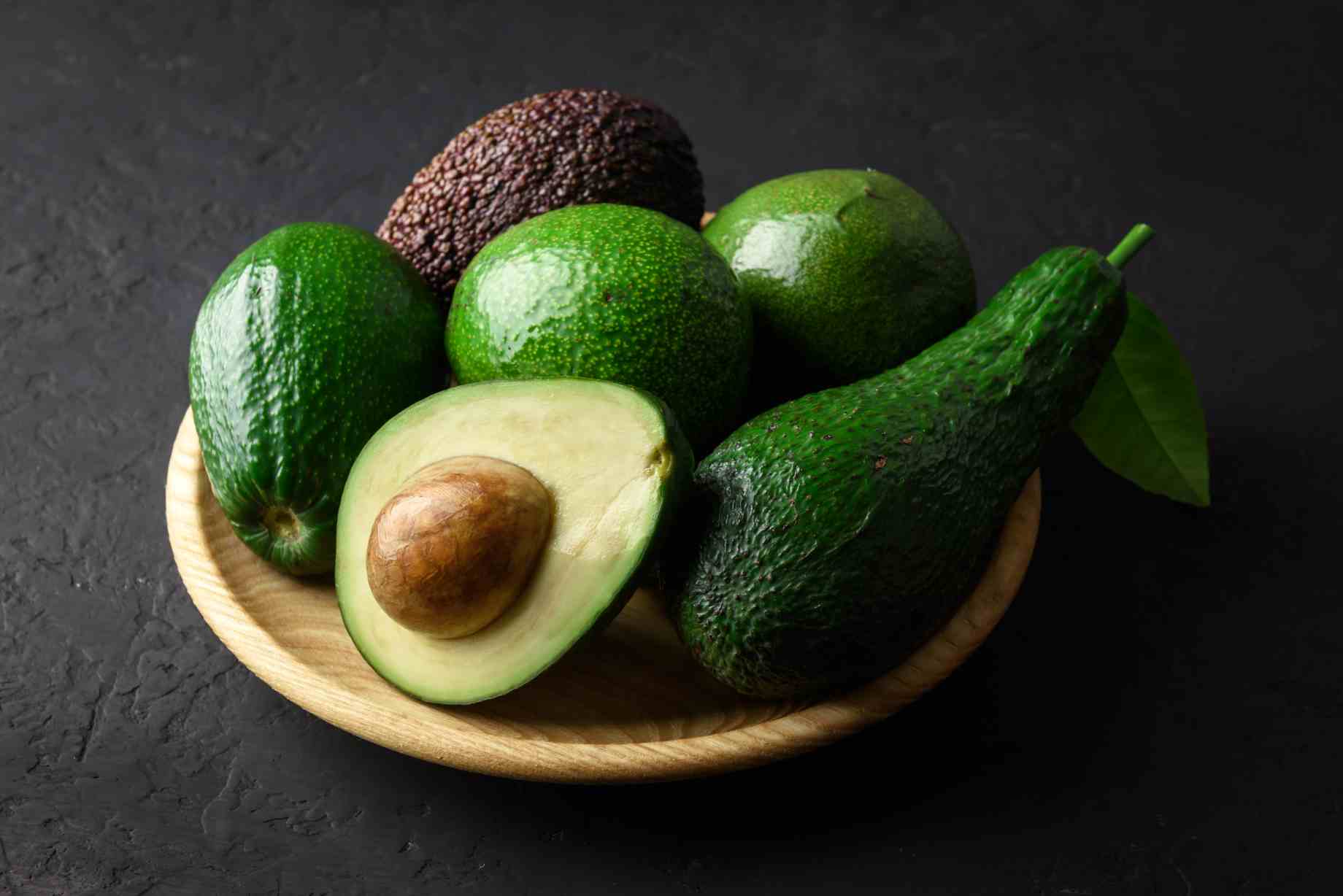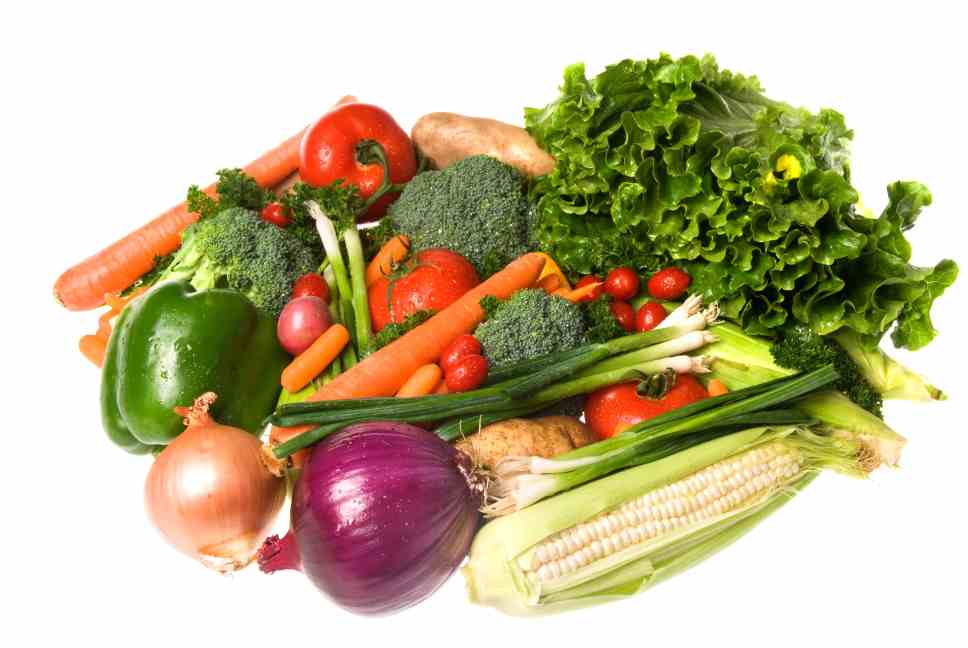40 Vitamin B2 Rich Foods to Include in Your Diet

Do you know your body can store only a small amount of vitamin B2? Also, the body cannot produce enough riboflavin to meet the dietary requirements. This vital nutrient supports energy production, cell function, and the metabolism of fats, drugs, and steroids. Therefore, individuals must plan a meal that maintains a balanced proportion of vitamin B2 foods for cellular growth and metabolism.
Keep reading to know the top vitamin B2 food sources that can make your diet nutritious and prevent diseases.

Table of Contents

What is Vitamin B2?
Vitamin B2, or riboflavin, is a water-soluble vitamin that converts carbohydrates into adenosine triphosphate (ATP), which is essential for storing energy in our muscles. The body also needs foods that contain vitamin B2 to convert vitamins B6 and B9, which are essential for red blood cell production and body growth.
Riboflavin also acts as an antioxidant to fight free radicals in our bodies. These radicals damage the DNA and cells in our bodies, leading to numerous health conditions. Therefore, a vitamin B2 deficiency can fasten the ageing process. In addition, individuals who avoid vitamin B2 foods are prone to heart disease and cancer.
Most healthy adults can usually get their Vitamin B2 from a well-balanced diet. Their diet must include a balanced ratio of vitamin B2 fruits and vegetables for complete well-being.
We have included a vitamin B2 foods list in the following section to help you prepare a healthy diet plan.
Sources of Vitamin B2
Foods naturally contain vitamin B2, often known as riboflavin; it can also be added to food or purchased as a supplement. Small amounts of riboflavin can be produced by gut bacteria, but not in sufficient proportions to meet nutritional requirements.
Milk, eggs, lean meats, and organ meats like kidney and liver are among foods high in riboflavin. Riboflavin is also present in several plants.
Top 40 Food Items High in Vitamin B2
These foods are necessary to reap the benefits of vitamin B2 in your body and keep fit. Include some of these foods to ensure adequate vitamin B2 intake.
List of Vitamin B2 Rich Foods

If you are wondering which food vitamin B2 is found in, here is a curated list of the same for your reference. [1]
SNo. |
Food Sources | Description |
| 1 | Egg | Eggs are considered the best source of vitamins. They complement almost every meal type and cuisine. Every 100 gm serving of eggs contains around 0.5 mg of vitamin B2. |
| 2 | Ground Pork | Ground pork is a good source of protein, minerals and vitamins. Scientifically, 100 gm of ground pork contains 0.2 mg of riboflavin. |
| 3 | Salmon | Salmon is a good source of protein that can be enjoyed raw, fried or smoked. This fish contains 0.5 mg of vitamin B2 per 100 gm. |
| 4 | Bluefin Tuna | This saltwater fish contains nearly 0.3mg of riboflavin per 100 gm serving. Tuna fish is also a good source of Omega 3 and Omega 6 fatty acids. |
| 5 | Soybeans | If you are a vegetarian wondering which food has vitamin B2, soybeans can be a great option. They can also consume it in the form of milk. These legumes are also rich in minerals and fibres. Each 100 gm serving of soybean contains nearly 0.87mg of vitamin B2. |
| 6 | Squid | A squid is a form of shellfish that are found in Asia, Hawaii and the Mediterranean regions. They are rich in riboflavin and other nutrients. Every 100 gm serving of squid contains around 0.412 mg of vitamin B2. |
| 7 | Wheat Germ | Wheat germ is the reproductive part of a plant. This is basically the by-product of milling. Individuals can consume it in the form of cereals or add it to their salad. Scientifically, wheat germ contains 0.8 mg of vitamin B2 per 100 gm serving. |
| 8 | Liver | Animal liver is considered one of the greatest vitamin B2 sources. Among them, dieticians highly recommend lamb livers. Every 100 gm serving of liver contains around 3.63 mg of vitamin B2. Livers are also rich in folate and vitamin B12. |
| 9 | Tempeh | Tempeh is a variant of fermented soy products from Indonesia. It is one of the best plant-based vitamin B2 rich foods containing fibre, protein, and other essential nutrients. Each 100 gm serving of Tempeh contains around 0.358 mg of vitamin B2. |
| 10 | Fish Eggs | Many individuals love eating fish roe or eggs. They are typically salty and contain Omega-3 protein and vitamins. In addition, they contain around 0.7 mg of vitamin B2 per 100 gm serving. |
| 11 | Atlantic Mackerel | This exotic fish contains 0.412 mg of riboflavin per 100gm serving. |
| 12 | Greek Yoghurt | This thick fermented dairy product is rich in protein, phosphorus, calcium and Vitamin B2. It contains around 0.233 mg of vitamin B2 per 100 gm serving. |
| 13 | Beef Kidney | Beef kidney is again a good source of vitamin B2. Every 100 gm of beef kidney contains around 2.8 mg of riboflavin. |
| 14 | Button Mushroom | Every 100 gm of button mushroom contains 0.5 mg of vitamin B2. |
| 15 | Mussels | These shellfish contain 0.4 mg of vitamin B2 per 100 gm serving. |
| 16 | Feta Cheese | Feta cheese contains nearly 0.8 mg of vitamin B2 per 100 gm serving. |
| 17 | Dried Shiitake Mushrooms | Dried shiitake mushrooms are a great source of riboflavin. They contain nearly 1.27 mg of vitamin B2 per serving. |
| 18 | Almonds | Almonds contain nearly 1.1 mg of vitamin B2 per 100 gm serving. |
| 19 | Beef Skirt Steak | The lean part of beef steak contains nearly 0.9 m of riboflavin per 100 gm serving. |
| 20 | Anchovies | Anchovies are small-sized fish that contain Omega-3, minerals and protein. It also contains nearly 0.3 mg of vitamin B2 per 100 gm serving. |
List of Vitamin B2 Rich Fruits

These fruits are not only delicious but also provide the necessary vitamins too! Here is a list of vitamin B2 fruits in India that individuals can include in their diet. [2]
SNo. |
Fruits | Description |
| 21 | Avocado | Avocados are vitamin B2 rich fruits that complement salads and cuisines. Every 100 gm of avocado contains 0.1 mg of riboflavin. |
| 22 | Dried Apple | Dried apples contain nearly 0.2 mg of vitamin B2 per 100 gm serving. |
| 23 | Banana | Each 100 gm serving of bananas contains nearly 0.1 mg of vitamin B2. |
| 24 | Dates | Dates complement desserts, cereals and sweets. These fruits contain nearly 0.1 mg of vitamin B2 per 100 gm serving. |
| 25 | Passion Fruit | This exotic fruit contains nearly 0.1 mg of vitamin B2 per 100 gm serving. |
| 26 | Muscadine Grapes | Muscadine grapes top the list of vitamin B2 fruits. These grapes contain nearly 1.5 mg of vitamin B2 per 100 gm serving. |
| 27 | Durian | This fruit contains nearly 0.2 mg of vitamin B2 per 100 gm serving. |
| 28 | Tamarind | This tangy and sweet flavour fruit contains 0.2 mg of vitamin B2 per 100 gm serving. |
| 29 | Mamey Sapote | This exotic fruit contains nearly 0.1mg of vitamin B2 per 100 gm serving. |
| 30 | Dried Longans | These fruits contain nearly 0.5 mg of vitamin B2 per 100 gm serving. |
Apart from knowing which fruit has the most vitamin B2, individuals should also check the riboflavin-rich vegetables.
List of Vitamin B2 Rich Vegetables

Include at least a few of these delectable vegetables in your daily meals. For a comprehensive idea, read through the following list of vitamin B2-rich vegetables. Check the list below to know which vegetables have vitamin B2. [3]
SNo. |
Vegetables | Description |
| 31 | Spinach | This nutritious green leafy vegetable contains nearly 0.2 mg of riboflavin per 100 gm serving. |
| 32 | Kidney Beans | These sprouts contain 0.3 mg of vitamin B2 per 100 gm serving. |
| 33 | Tomato | Tomatoes (sundried) have nearly 0.5 mg of vitamin B2 per 100 gm serving. |
| 34 | Asparagus | This exotic vegetable contains nearly 0.1 mg of riboflavin per 100 gm serving. |
| 35 | Dried Spirulina Seaweed | It contains around 3.7 mg of vitamin B2 per 100 gm serving. |
| 36 | Artichokes | Artichokes also contain nearly 0.1 mg of riboflavin per 100 gm serving. |
| 37 | Sweet Potatoes | These potatoes contain 0.1 mg of riboflavin per 100 gm serving. |
| 38 | Kelp | This seaweed contains nearly 0.2 mg of riboflavin per 100 gm serving. |
| 39 | Chinese Broccoli | Chinese Broccoli also has 0.2 mg of vitamin B2 per 100 gm serving. |
| 40 | Peas | Peas contain 0.1 mg of vitamin B2 per 100 gm serving. |
Who Should Take B Complex Vitamins?
Typically, every age group should consume vitamin B2 vegetables and fruits for a healthier lifestyle.
Healthcare experts recommend pregnant women maintain a vitamin B2-rich diet to support the fetus's growth.
Individuals aged over 50 years also need to consume vitamin B2 foods for complete well-being.
Vegans who avoid milk and meat must consume riboflavin-rich vegetables and fruits to balance their dietary needs.
Hence, vitamin B2 is essential for longevity and good health.
What is the Daily Recommended Intake for Vitamin B2?
Vitamin B2 is necessary for various bodily functions like energy production, maintaining healthy skin, and many other reasons. The recommended daily intake of vitamin B2 differs by age and gender. Here's a table to simplify the recommended vitamin B2 intake:
Age Group |
Recommended Vitamin B2 Intake (milligrams per day) |
| Children ages 2 to 5 years | 2.1 mg |
| Children ages 6 to 11 years | 2.2 mg |
| Teens ages 12 to 19 years | 2.3 mg |
| Men (adult) | 4.5 mg |
| Women (adult) | 4.7 mg |
Now that you know how to increase vitamin B2 levels via diet and medical help, you can begin your journey to healthy living!
What are the Health Benefits of Including Vitamin B2 Rich Foods?
From bolstering energy levels to fortifying skin and eyes, riboflavin significantly maintains optimal health. Here are the health benefits of including vitamin B2 rich foods:
- Energy Production: Vitamin B2, riboflavin, is crucial for converting carbohydrates into energy. It also helps in the metabolism of fats and proteins.
- Healthy Skin and Eyes: Riboflavin is essential for maintaining healthy skin, hair, and eyes. It is involved in the production of collagen, which is essential for skin elasticity, and it contributes to the health of the cornea.
- Antioxidant Activity: As an antioxidant, vitamin B2 helps protect cells from damage caused by free radicals. This can help reduce the risk of chronic diseases such as cancer and heart disease.
- Nervous System Support: Riboflavin is necessary for the proper functioning of the nervous system. It aids in producing neurotransmitters essential for communication between nerve cells.
- Red Blood Cell Formation: Vitamin B2 produces red blood cells, which carry oxygen throughout the body. Adequate riboflavin intake helps prevent anaemia and promotes overall cardiovascular health.
- Migraine Prevention: Some studies suggest that riboflavin supplementation may help reduce the frequency and severity of migraines. However, more research is needed to confirm this effect.
- Healthy Pregnancy: During pregnancy, women need increased levels of riboflavin to support the growth and development of the foetus. Adequate intake of vitamin B2 rich foods is important for maternal and foetal health.
- Athletic Performance: Riboflavin is involved in producing ATP, the primary energy source for muscle contractions. Athletes and active individuals may benefit from sufficient vitamin B2 intake to support their performance and recovery.
Different Ways to Include Vitamin B2 Rich Foods in Your Diet
By incorporating these vitamin B2 rich foods into your diet in various creative ways, you can ensure that you meet your daily riboflavin requirements. Here are different ways to include vitamin B2 rich foods in your diet as meals or dishes:
- Creamy Yoghurt Bowl with Berries: Start your day with a yoghurt bowl topped with fresh vitamin B2 rich berries such as strawberries, blueberries, or raspberries for a nutritious and delicious breakfast packed with riboflavin.
- Grilled Chicken and Vegetable Skewers: Grill skewers by threading pieces of lean chicken breast, bell peppers, onions, and zucchini until the chicken is cooked and the vegetables are tender. Enjoy a meal rich in vitamin B2.
- Spinach and Kale Salad with Quinoa: Mix fresh spinach and kale leaves with cooked quinoa, cherry tomatoes, cucumber slices, and toasted almonds to create a vibrant salad. The leafy greens provide vitamin B2.
- Whole Wheat Pasta Primavera: Cook whole wheat pasta and toss with sautéed vegetables such as broccoli, bell peppers, mushrooms, and cherry tomatoes. Finish with grated Parmesan cheese and fresh herbs for a riboflavin rich pasta dish.
- Almond and Berry Smoothie Bowl: Blend frozen berries, a banana, almond milk, and a scoop of protein powder. Top the smoothie with sliced almonds and chia seeds. This refreshing smoothie bowl is packed with vitamin B2 from almonds and berries.
- Egg and Vegetable Frittata: Sauté diced vegetables such as spinach, bell peppers, onions, and mushrooms in a skillet. Pour beaten eggs over the vegetables and cook. Sprinkle with cheese and herbs, then broil. Enjoy a hearty and riboflavin-rich meal any time of day.
Symptoms of Vitamin B2 Deficiency
Consult a healthcare professional for proper diagnosis and treatment if you suspect a riboflavin deficiency. Symptoms of vitamin B2 (Riboflavin) deficiency may include:
- Fatigue: One of the most common symptoms of riboflavin deficiency is fatigue or a general lack of energy.
- Cracks or Sores on the Lips and Corners of the Mouth: Riboflavin deficiency can lead to inflammation and cracking of the lips, known as cheilosis, and the corners of the mouth, known as angular stomatitis.
- Red, Itchy, or Watery Eyes: Riboflavin deficiency may result in redness, itching, or watering of the eyes and sensitivity to light.
- Skin Problems: Riboflavin deficiency can lead to various skin problems, including dermatitis, which is characterised by dry, flaky, or oily skin.
- Mental Confusion: Riboflavin deficiency may cause mental confusion, difficulty concentrating, or cognitive impairment.
- Migraine Headaches: Some research suggests that riboflavin deficiency may be associated with an increased risk of migraine headaches in certain individuals.
Health Risks of Not Getting Enough Vitamin B2
Consuming adequate vitamin B2 through a balanced diet or supplementation is important. Not getting enough vitamin B2 (Riboflavin) can lead to several health risks:
Without enough vitamin B2, the body may struggle to produce energy efficiently, leading to feelings of fatigue and weakness.
Insufficient riboflavin intake leads to digestive problems like indigestion, nausea, and diarrhoea.
Riboflavin deficiency can contribute to the development of anaemia.
In severe cases, riboflavin deficiency can affect the nervous system, leading to confusion, difficulty concentrating, and nerve damage.
Studies suggest that inadequate riboflavin intake may be associated with an increased risk of migraine headaches.
Insufficient riboflavin intake may weaken the immune response, making people susceptible to infections and illnesses.
In children and adolescents, riboflavin deficiency can interfere with growth and development, leading to stunted growth or delayed puberty.
Side Effects of Excessive Vitamin B2 Intake
Excessive intake of vitamin B2 (Riboflavin) is generally considered safe, as it is water-soluble and excess amounts are usually excreted in the urine. However, very high doses of riboflavin supplementation may lead to some side effects:
- Yellow-Orange Urine: High doses of riboflavin can cause urine to turn yellow. This discolouration is harmless, as the body excretes the excess riboflavin.
- Gastrointestinal Disturbances: Some individuals may experience digestive issues such as nausea, vomiting, diarrhoea, or increased urine output when consuming high riboflavin supplements.
- Increased Sensitivity to Light: In rare cases, excessive riboflavin intake may lead to increased sensitivity to light, known as photophobia.
- Skin Reactions: High doses of riboflavin supplementation may cause skin reactions such as itching, numbness, or tingling.
- Increased Risk of Kidney Stones: Some evidence suggests that very high doses of riboflavin supplements may increase the risk of developing kidney stones in susceptible individuals.
Should You Take a Vitamin B2 Supplement?
Most people don't require supplements to get enough riboflavin from a balanced diet. Low amounts of vitamin B2, however, can be brought on by several illnesses, including cancer, alcoholism, liver disease, persistent infections, and stomach/intestinal issues. Consult a healthcare provider if you notice any adverse effects or concerns regarding your riboflavin intake. Your medical condition and response to treatment will determine the dosage.
Although taking B vitamin supplements can be beneficial, it's still advisable to try to eat many complete foods that naturally contain vitamin B2 and other essential elements. Eating a variety of unprocessed, high-nutrient foods in a balanced diet helps most people get enough vitamin B2 and prevent vitamin B2 insufficiency.
It's also common for vitamin B2 to be included in multivitamins and B complex tablets, which makes meeting your daily requirements easier.













